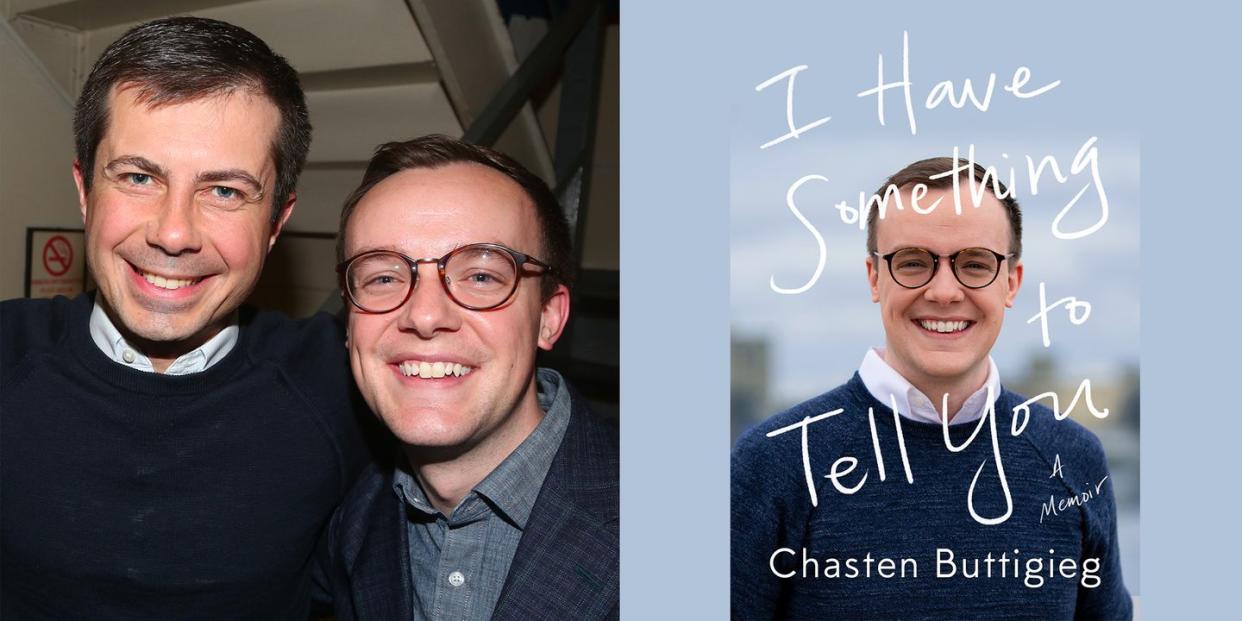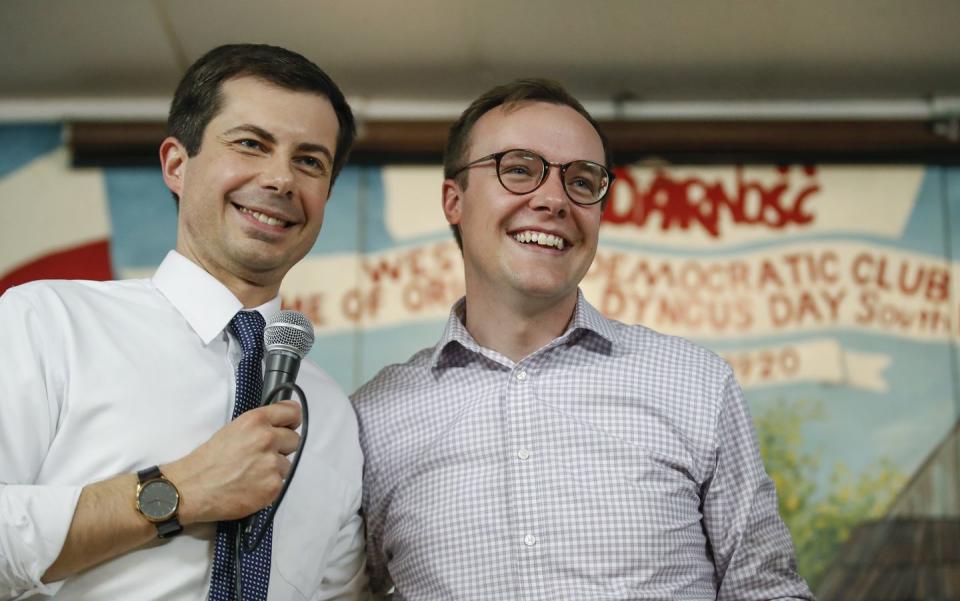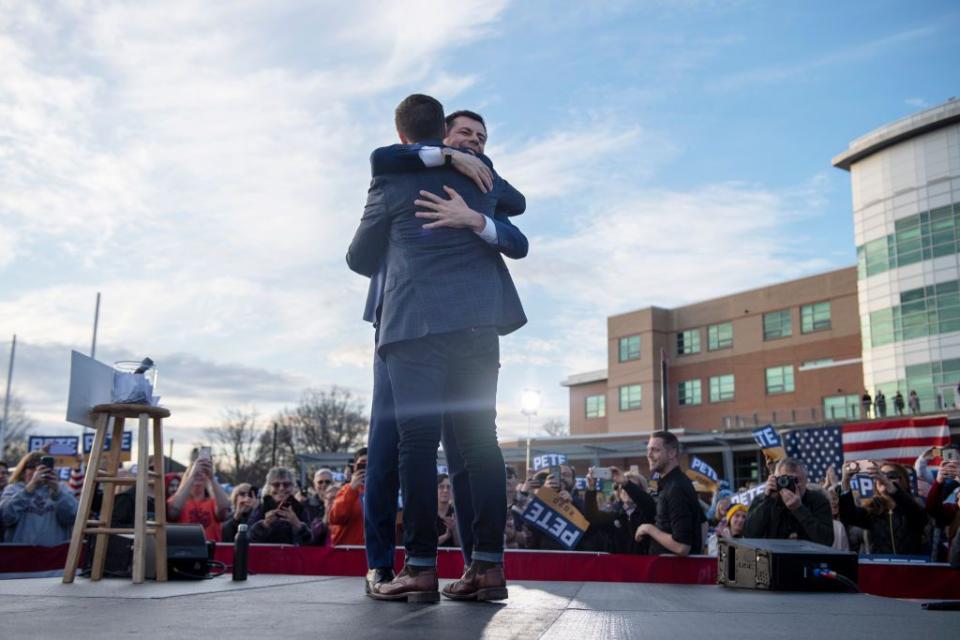Chasten Buttigieg On the Time He Went on a Date...to the White House

Chasten Buttigieg's new memoir, I Have Something to Tell You, is available on September 1.
The memoir touches on his career as a teacher, growing up gay in the Midwest, and his marriage to politician Pete Buttigieg.
Below, read an excerpt about his experiences meeting Barack and Michelle Obama.
For a minute there, in 2019, Chasten Buttigieg had the potential of becoming the United States' first-ever first gentleman. His husband, Mayor Pete Buttigieg, was a frontrunner for the Democratic nomination. Politics aside, Pete's candidacy was historic: He was the first millennial, and first openly gay man, to run for president of the United States.
While his husband was busy running for president, Chasten was busy becoming an Internet star. With his well-timed clap-backs, dog gifs, and brand of woke positivity, Chasten quickly amassed an enormous social media following. Mashable called him "the Twitter celebrity we deserve." Supportive and adept at navigating the digital age, Politico said he was "winning the 2020 spouse primary."
Though Pete is out of the race, Chasten has maintained his social media presence. If you're one of his many followers, the news that Chasten wrote a memoir is no surprise: Each Tuesday, he shares a snippet on an Instagram Live segment called #SomethingToTellYouTuesdays.
With Something to Tell You, out September 1, Chasten will share his own story, from growing up in a conservative Midwestern household to becoming a teacher—and, of course, meeting (and falling for) the mayor of South Bend, Indiana on a dating app in 2015. Below, find an excerpt from a particularly exciting moment in Chasten and Pete's dating history: Pete, then a rising political star, invites Chasten to the White House's annual Christmas party, where he meets none other than Barack and Michelle Obama. Casual.
Excerpted from I HAVE SOMETHING TO TELL YOU published by Atria Books, a division of Simon & Schuster, Inc. Copyright ? 2020 by Chasten Buttigieg.
A few weeks after that gathering in Chicago, Peter asked me if I owned a suit. I did not—I had the blazer I’d bought at H&M for $50 when he asked me to join him at what became a crash course in political schmoozing.
At the time, that was the most I had ever spent on an article of clothing. Fifty dollars was a lot of money for me, so the question induced a momentary panic.But we hadn’t been together that long, so I just kept it cool and said no, I didn’t have one. The next weekend, he took me to the mall, led me into Banana Republic, and bought me the first suit I’d ever owned. “You’re going to need that,” he said, and then vanished into the mist. (He just wants to get a pretzel.)
A few days later, he gave me a Christmas card, and inside, there was an invitation to the annual White House Christmas party. Thank goodness I had something to wear.
There was no one I could consult to ask what it meant when your boyfriend invited you to the White House for Christmas, but it didn’t matter—how romantic, how exciting, how embarrassing to have had my boyfriend buy me a suit so he could take me to meet the president. (In photos of us from the night, I look ridiculously skinny. I can’t even fit in that suit anymore, which is rude. But maybe also a sign of true love?) Nevertheless, I went to DC.
I’d never been to the White House before, and the tour we got was great. But the highlight was meeting Barack and Michelle Obama. At one point in the revelry, it was announced that the Obamas were arriving from the residence to greet any visitors who wanted to meet them. Peter—who, in addition to his other accomplishments, had been identified by Obamas a young Democrat to watch—told me to wiggle my way up to the front and say hi. “No way,” I replied. How could someone as awkward as Chasten say hi to the president without embarrassing his rising-star mayor boyfriend?
But soon I found myself maneuvering through the tight crowd that had gathered to shake hands with or get a picture of the president. I was almost to the front of the line, things were a little chaotic, and I was reaching my hand over the person in front of me to shake hands with Obama when a random guy barreled into me from behind. I turned to look at what had happened, and in the meantime, I felt a hand on my hand. I turned back around, saw Barack Obama was holding my hand, and immediately recoiled. About halfway into this maneuver, I realized what I was doing, so I tried to recover by grabbing his pointer finger and shaking it. Like an infant! But not in a cute way!
“Merry Christmas, Mr. President!” I exclaimed red-faced. “Yes,” he replied, staring at my hand shaking his finger. By the time Michelle made her way to me, I was on the verge of tears for feeling like an absolute dimwit.
Looking back in retrospect, after meeting thousands of people on the campaign trail, I now know that there is goofiness and memorable uncomfortable hilarity every day when you have to meet so many people. Last year, this innocent episode of finger-pulling wouldn’t have even registered on my scale of “bizarre things we're definitely going to reflect on when we get back to the car.” But at the time, I was very worried that when the Obamas retired to bed that night, Michelle would say something like,“Hey, did Mayor Pete’s boyfriend pull your finger?” And then President Obama would laugh and reply, “Yeah. What a weirdo. Let’s never invite them back.”

I returned to Peter horrified. “What’s wrong?” he asked, and I could only reply, “I think I just pulled Barack Obama’s finger.” Peter laughed. I enjoyed my share of White House eggnog, and the rest is history.
As time went on, navigating these spaces got easier for me, in part because of the way Peter handled them. He quickly proved he was the same guy everywhere he went; he never pretends to be something he’s not, but he still accommodates different types of people, without making the situation awkward or contentious.
And he was never shy about introducing me as his boyfriend—even with Mike Pence. One evening, Peter and I attended the Indiana Society of Chicago dinner. (Yes, that’s a thing.) Mike Pence was making his way around the room, greeting mayors and elected officials from different cities.
Then, when he saw the South Bend table—and saw Peter and me approach him for a handshake—for some reason he didn’t have time to stop and say hello. Peter swears it wasn’t an offense, just an accident, but I knew that look in the governor's eyes—I’d seen it all my life from hateful passersby. I didn’t need the handshake, but if I’ve learned anything about my husband in the last five years, it’s that he always takes the highroad and never returns nastiness with nastiness.
When Peter says Mike Pence is a decent guy, he doesn’t mean everything he does is acceptable. He just means that he’s quiet and capable of exchanging pleasantries with an openly gay man despite being on the record all over the place as despising, ahem, our kind, and actively campaigning against us. (See: the Religious Freedom Restoration Act.)
Whenever Peter would have a sidebar with Pence at an event, I would look over at the two of them chatting like nothing was odd and marvelous. I know that this is a horrifying proposition for many liberals and progressives, who would like to say that if given the chance they would loudly protest Pence's Presence and leave the room in a dramatic and meaningful huff. Watching Peter work with someone who was on the record against our own rights with a knot in my stomach, feeling as if I wasn't supposed to speak up on behalf of the countless Hoosiers he’d harmed, I always thought something similar. How could my partner work with someone so awful?
Because South Bend was more important.
That is, as I would come to learn, leadership: the ability to put aside (huge) misgivings for the good of the people who elected you into office.
But I’d still wonder, How does Peter do it? Eventually I learned that there’s a time and place to voice my opinion, and I knew that Mike Pence didn’t care about me or what I have to say at all. If I walked away from him in a dramatic and meaningful huff, it would only serve his narrative about us trouble-making gays. He wasn’t worth my pleasantries, but our city also wasn't deserving of the consequences of my potential disrespect. I held my tongue, and I held Peter’s hand. As a political spouse, I would come to learn that there are many times it’s best to let go of what you can’t control. Besides, I always trust that Peter knows what he’s doing.
A post shared by Pete Buttigieg (@pete.buttigieg) on Sep 29, 2019 at 9:56am PDT
At less contentious or awkward gatherings, Peter would pair me up with someone to hangout with so that I always had a backup conversation partner while he got down to business. If he wanted to be able to quickly exit the situation, he’d purposefully leave me out of a conversation so that I could come up and pull him away for some private reason—namely, that he was just as excited to get to date night as I was. I got very good at determining when he wanted my backup. Otherwise, he made a note of introducing me to everyone worth being introduced to, and he would take opportunities to center the conversations on me—“Oh, Chasten grew up in Michigan,” or “Chasten’s a teacher—he can tell you all about the substitute program.”

Still, there was much to figure out as we became more well known as a couple. It was awkward to be introduced as Peter’s “boyfriend.” For one thing, you can’t go around saying“boyfriend” in a political context for very long. The word suggests a high-school-ish lack of seriousness. “Oh, this old thing? Just a boyfriend I found lying around.” (For that we can blame the patriarchy, with a dash of homophobia. While “girlfriends” can ground the stereotypical “bachelor” to the real world—or the word can also just mean “friends who are girls”—a “boyfriend” is seen as suspicious until he puts a ring on it.) Once we started calling each other “partner,” people took us a little more seriously, but it’s still rare to show up at a political event where everyone knows why I’m there.
On the flip side, there were, comically, some people who didn’t realize Peter was gay until he introduced me, very pointedly, as his significant other. When we were still dating, he took me to a wedding in South Bend where an older couple from our church came up to us and started telling Peter all about how he should really meet their daughter, wink wink. “She’s a doctor, you two would really get along,” they gushed. “You should have coffee! Or maybe dinner! You could come to the house!”
As I stood by silently enjoying the dramatic irony, Peter was super-gracious. “Oh, yes, I’d love to meet her,” he replied without missing a beat. “Do you think she’d mind if I brought Chasten, my partner?” A chorus of “Oh! Um! Oh! Goodness!” followed.
The more public and serious our relationship got, the less intimidated I felt, but constituents and voters still frequently mistook me for a staffer, and sometimes I wasn’t sure I was not one myself. It was quite common, early on in South Bend, that someone would slickly handed me a card and say, “I know Pete’s probably really busy, but let’s get our offices to connect on this.”
I’d look at their card and smile. “Would you like for me to get this to Pete's office?” Landing a comeback that lets someone know you’re the husband, not the body man, is a feat in conversational agility. It was never my intention to be unkind, but it was also important for me to establish that I was an independent human being, and that I did not work for the mayor.
And it can be hard sometimes, even now, to remember that I’m just that—a person separate from my husband. After all, next to Peter, who am I? As our relationship approached common knowledge in South Bend, I felt I’d become the sounding board for the entire city—people might be nervous or awkward approaching Peter, but they were very comfortable telling me what was wrong with the town, or oftentimes, him. Of course, often it was all pleasantries. Peter was well liked in South Bend, and usually most folks just wanted to stop me in the grocery aisle or coffee shop to say how appreciative or proud they were of him.
I always wanted to help, but I also found some folks—and I say this with the utmost respect for our community—less than fully respectful of my time, my relationship, and my personhood. Without ever really being told, I understood that I represented Peter and his administration, so I had to be on my best behavior (and wear a presentable outfit) every time I stepped outside my front door. Even when someone would say something homophobic or otherwise deeply hurtful, I couldn’t just tell them to you know...even if they deserved it. I had to learn very polite, political ways to quickly separate myself from the offender and Peter from the negative claim.
The first step is to assess the situation: Am I safe, or is this person a “volcano,” ready to blow up at me? What do I have to gain from engaging with this person? If a guy is calling me a name in the produce section at the grocery store, nothing good can come from any conversation I have with him. He thinks he knows who I am and has responded to that false image.
A morning hike with this one ??
A post shared by Chasten Buttigieg (@chasten.buttigieg) on Mar 14, 2020 at 10:47am PDT
However, there are other situations in which I’ve been able to have a little fun. If somebody snarled something rude to me in passing at Target, it was easy to disarm her with openness. “I’m sorry? Did you have a comment you’d like me to submit to the administration?”
Typically, these sorts of people always get embarrassed and shuffle away; they don’t expect you to respond to their rude commentary. It’s sort of like Twitter in that respect. (On the other hand, when someone at a rally is shouting at me that I’m Satan here to suck the blood of children, my first thought is Well...they’re clearly never going to have a conversation about equality. I don't consider that kind of aggressive, vitriolic person a lost cause, exactly, but I don’t consider them worth my time in the moment, either. Which is also sort of like Twitter.)
Ultimately, the advice I’d give for dealing with these situations resembles what I’d tell a student who was being bullied: Remember that person’s comments say more about them than it does about you.
For more stories like this, sign up for our newsletter.
You Might Also Like
